Blockchain email services represent a transformative shift in digital communication by leveraging blockchain technology to create decentralized, secure, and censorship-resistant email platforms. Unlike traditional email systems reliant on centralized servers vulnerable to hacking, data breaches, and censorship, blockchain email services distribute message data across multiple nodes, enhancing security and user control. This guide explores the core concepts, technical architecture, platforms, benefits, and enterprise-grade solutions that make blockchain email a compelling choice for Web3 entrepreneurs, IT managers, developers, and privacy advocates.
As demand for secure and private communication grows, blockchain email services offer a trustless environment where users maintain control over their encryption keys and data. This technology integrates with blockchain domains and Web3 identities, supporting censorship resistance and compliance with regulations like GDPR. Throughout this comprehensive guide, we will answer key questions such as what is a blockchain email service?, how decentralized email works, and explore practical applications for businesses and developers.
This article is designed for an intermediate-to-advanced audience, including corporate decision makers, IT professionals, developers, and tech-savvy privacy advocates who seek authoritative yet accessible explanations. We also include detailed comparisons, security insights, compliance discussions, and developer-focused setup guides to cover the full spectrum of interests and knowledge levels.
Table of Contents
- Introduction
- What is a Blockchain Email Service?
- How Does Decentralized Email Work?
- Top Platforms Offering Blockchain-Based Email
- Security and Privacy of Blockchain Email Services
- Benefits of Using a Blockchain Email Service
- Enterprise-Grade Blockchain Email Hosting with GDPR Compliance
- Self-Hosting Open-Source Blockchain Email Services for Developer Teams
- FAQs: Blockchain Email Service Common Concerns
- Conclusion
What is a Blockchain Email Service?
A blockchain email service leverages blockchain technology to create a decentralized and secure platform for sending and receiving emails. Unlike traditional email systems that depend on centralized servers prone to hacking, censorship, and data breaches, blockchain email records each message as a transaction on a distributed ledger, ensuring immutability, transparency, and enhanced privacy[1].
These services use cryptographic keys to give users full ownership and control over their data. Platforms like LedgerMail and Mailchain replace conventional email protocols with blockchain transactions, reducing spam and unauthorized access. This revolutionary approach aligns with the Web3 vision of user sovereignty and secure digital identity.
Blockchain email differs significantly from traditional email by eliminating central points of failure and enabling censorship-resistant communication. This foundational understanding sets the stage for exploring how decentralized email systems operate and their unique benefits.
How Does Decentralized Email Work?
Decentralized email replaces the traditional server-based model with a peer-to-peer network underpinned by blockchain technology. Each email message is treated as a blockchain transaction, validated through consensus algorithms like Proof of Stake (PoS) or Multi-party Computation (MPC)[2].
Users control their cryptographic keys, ensuring that only authorized parties can decrypt and read messages. Messages are stored in an encrypted, tamper-proof manner across distributed nodes, preventing unauthorized modification or censorship.
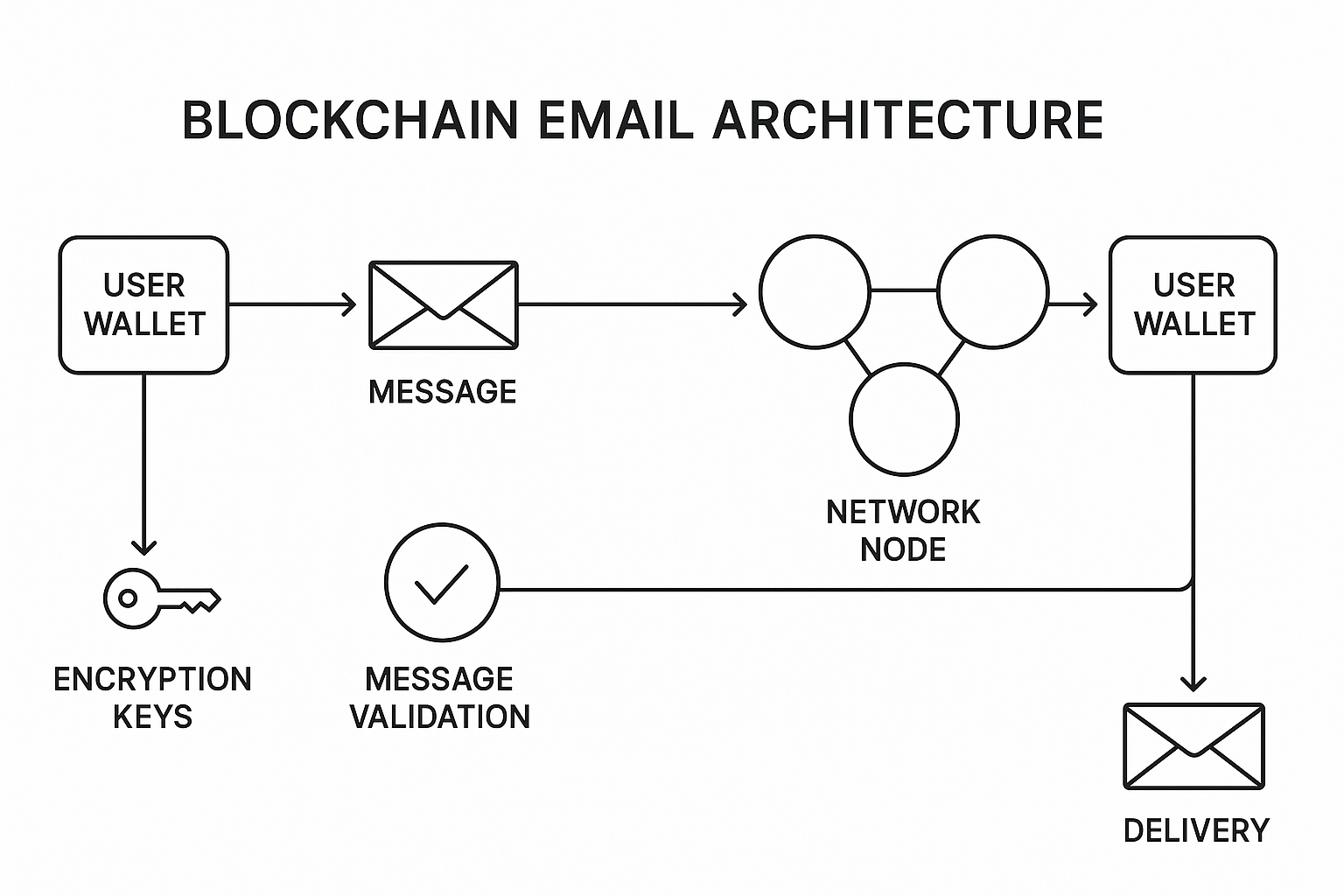
Platforms such as LedgerMail utilize private blockchains for enterprise-grade security, offering a trustless environment where message transparency coexists with confidentiality. This architecture enhances security, privacy, and censorship resistance beyond what traditional email systems can provide.
Top Platforms Offering Blockchain-Based Email
Leading blockchain email platforms include LedgerMail, Mailchain, and Cryptamail, each offering unique features catering to different user needs. LedgerMail provides enterprise-grade solutions with private blockchain infrastructure and advanced key management. Mailchain focuses on enabling encrypted communication between blockchain wallet addresses, ideal for Web3 users. Cryptamail emphasizes end-to-end encryption and immutable records.
Choosing the right platform depends on factors such as security protocols, compliance requirements, ease of integration, and target user base. This section compares these providers based on features, pricing, privacy standards, and decentralization levels to help users make informed decisions.
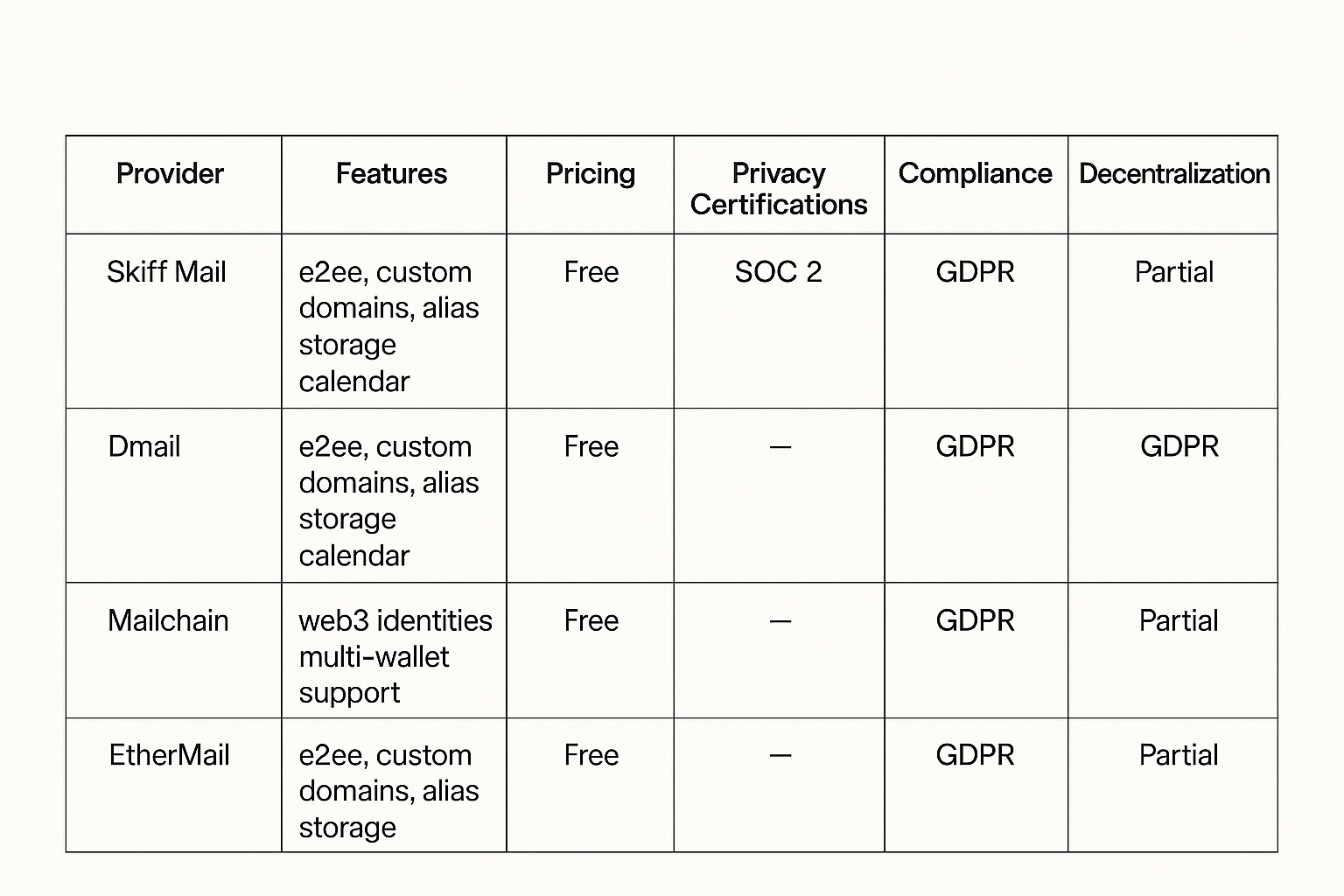
Security and Privacy of Blockchain Email Services
Blockchain email services offer enhanced security through decentralized storage, cryptographic encryption, and immutable ledgers. End-to-end encryption ensures that only intended recipients can access email content, while consensus mechanisms prevent tampering.
Platforms like LedgerMail leverage Multi-party Computation for secure key management, reducing the risk of unauthorized access. Privacy features include pseudonymous identities, off-chain storage for sensitive data, and compliance with privacy regulations.
Censorship resistance is inherent in the decentralized architecture, preventing any single entity from blocking or altering communications. These security and privacy attributes make blockchain email considerably safer than traditional email services.
Benefits of Using a Blockchain Email Service
Blockchain email services provide numerous benefits including enhanced security, privacy, and user control over data. They reduce risks of hacking, phishing, and data breaches by decentralizing email storage and management.
Businesses gain from tamper-proof audit trails, cost savings on infrastructure, and improved compliance with regulations. Developers benefit from access to cutting-edge cryptographic tools and the opportunity to build decentralized applications.
Additionally, users enjoy censorship-resistant communication, immutability of messages, and seamless integration with blockchain domains and Web3 identities, enabling a more trustworthy and autonomous email experience.
Enterprise-Grade Blockchain Email Hosting with GDPR Compliance
Enterprise blockchain email hosting must comply with GDPR requirements, balancing blockchain’s immutability with data protection laws. Solutions use hybrid models that separate sensitive data off-chain while maintaining encrypted references on-chain to honor user rights like data deletion and access.
Integrating blockchain email with existing enterprise email servers is facilitated via APIs and middleware, ensuring seamless communication and security enhancements without disrupting workflows.
Service Level Agreements (SLAs) typically guarantee 99.9% uptime with redundant, distributed infrastructure. Privacy and censorship resistance are ensured through cryptographic controls and decentralized architecture, providing robust data privacy safeguards. Costs vary depending on scale, features, and compliance requirements but often offer long-term value through enhanced security and reduced risk.
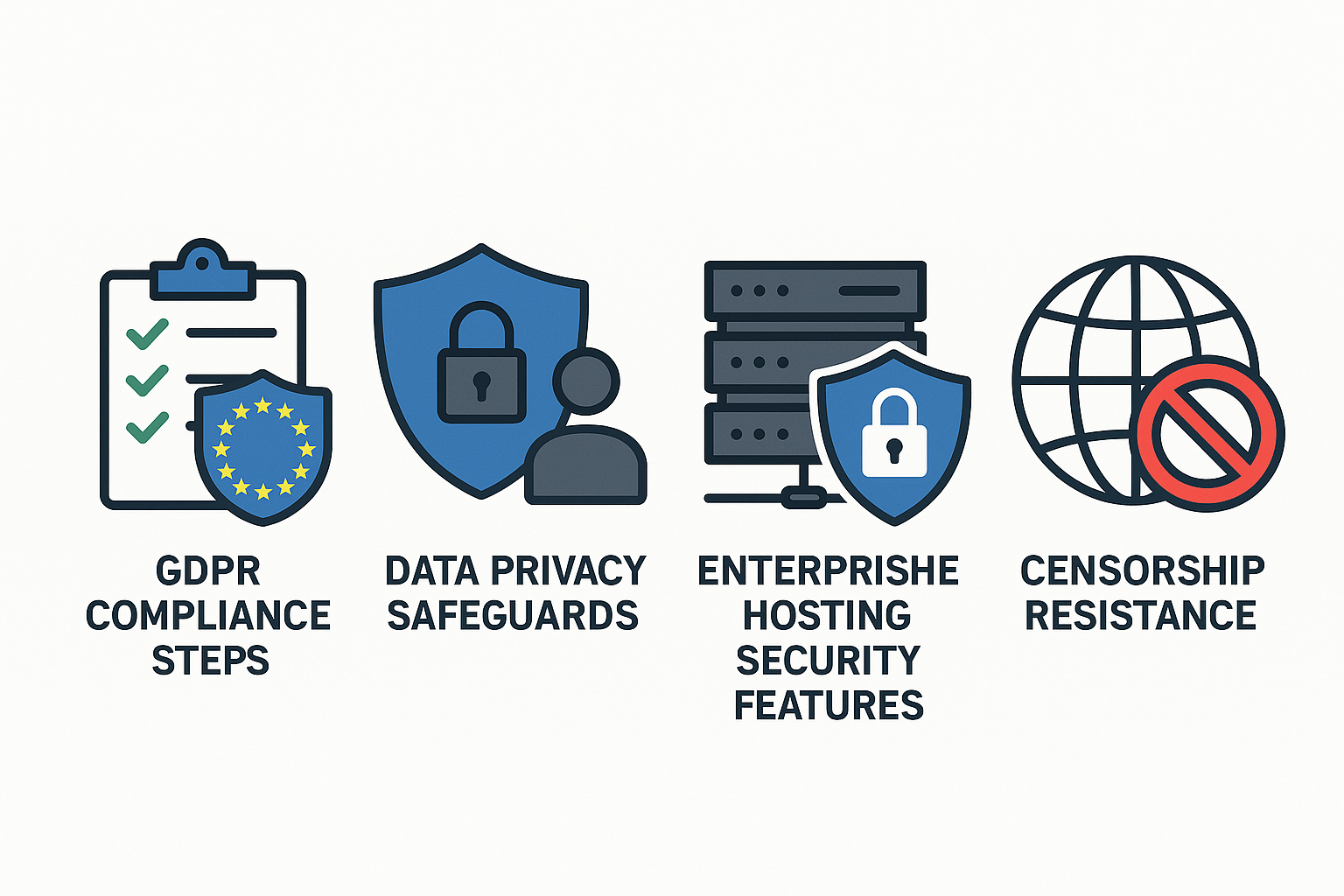
Self-Hosting Open-Source Blockchain Email Services for Developer Teams
Developers interested in self-hosting blockchain email can choose open-source platforms like Mailchain, which provide codebases for deploying decentralized email servers on private blockchains.
Setting up self-hosted services involves deploying blockchain nodes, configuring cryptographic key management (using Hardware Security Modules or Multi-party Computation), and integrating with email protocols through APIs or middleware.
Prerequisites include robust hardware, network redundancy, knowledge of blockchain development, cryptography, and compliance considerations. Performance and scalability are addressed through distributed node deployment, off-chain storage for large attachments, and load balancing.
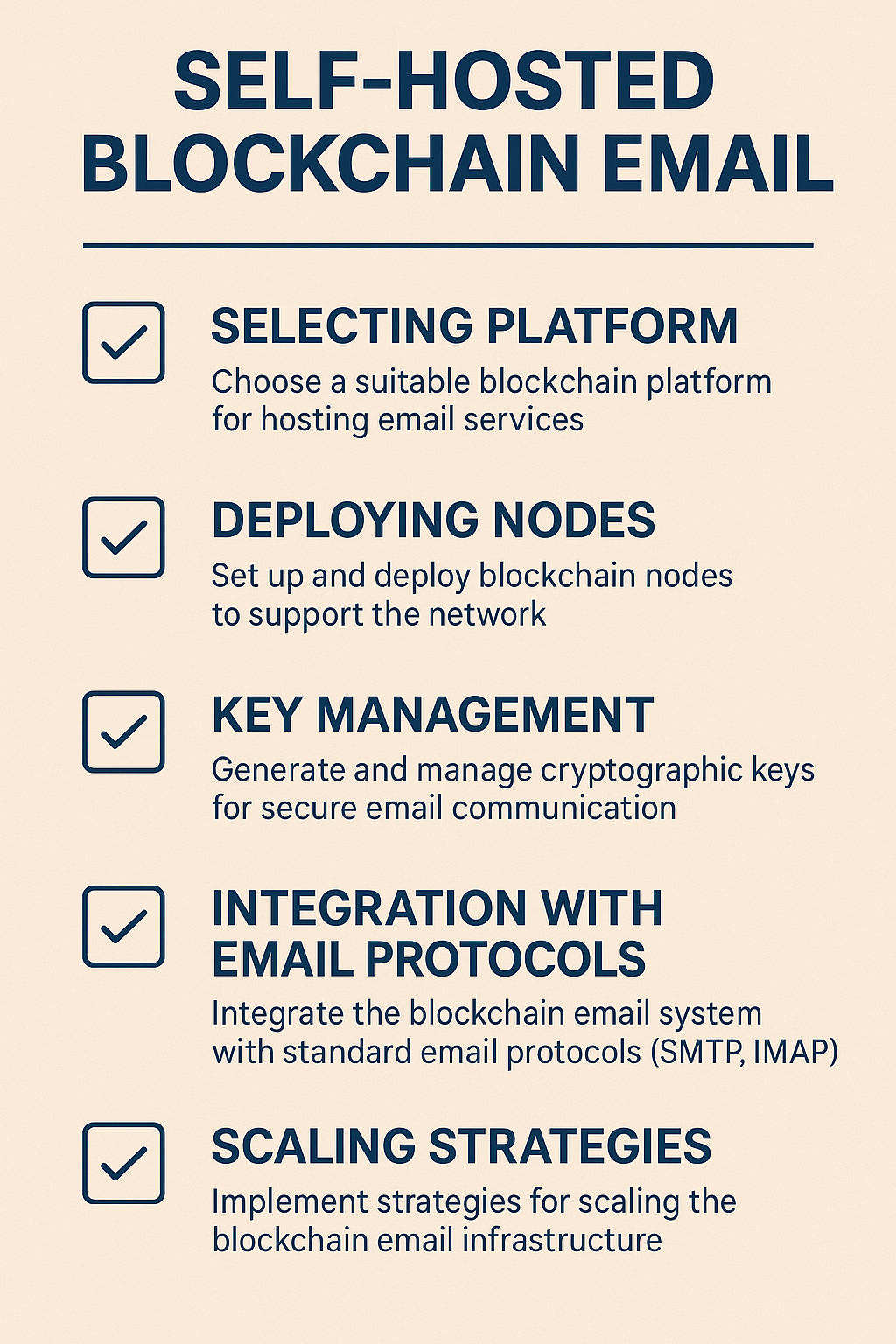
FAQs: Blockchain Email Service Common Concerns
This section addresses common questions and concerns about blockchain email services, including troubleshooting, support, and the future outlook of decentralized email technologies.
We clarify misconceptions around security, integration challenges, and scalability, helping users navigate the evolving landscape of blockchain-based email systems.
Conclusion
Blockchain email services represent a groundbreaking advancement in secure and private digital communication. By leveraging decentralized architectures, cryptographic protections, and compliance with regulations like GDPR, these solutions offer robust alternatives to traditional email systems.
Whether you are a business seeking enterprise-grade secure email, a developer aiming to implement self-hosted blockchain email servers, or a privacy advocate interested in censorship-resistant communication, blockchain email services provide significant benefits.
Ready to experience the future of secure email? Explore blockchain email services and domain integration with Hashtag.it.com to empower your digital communication with enhanced privacy and control.
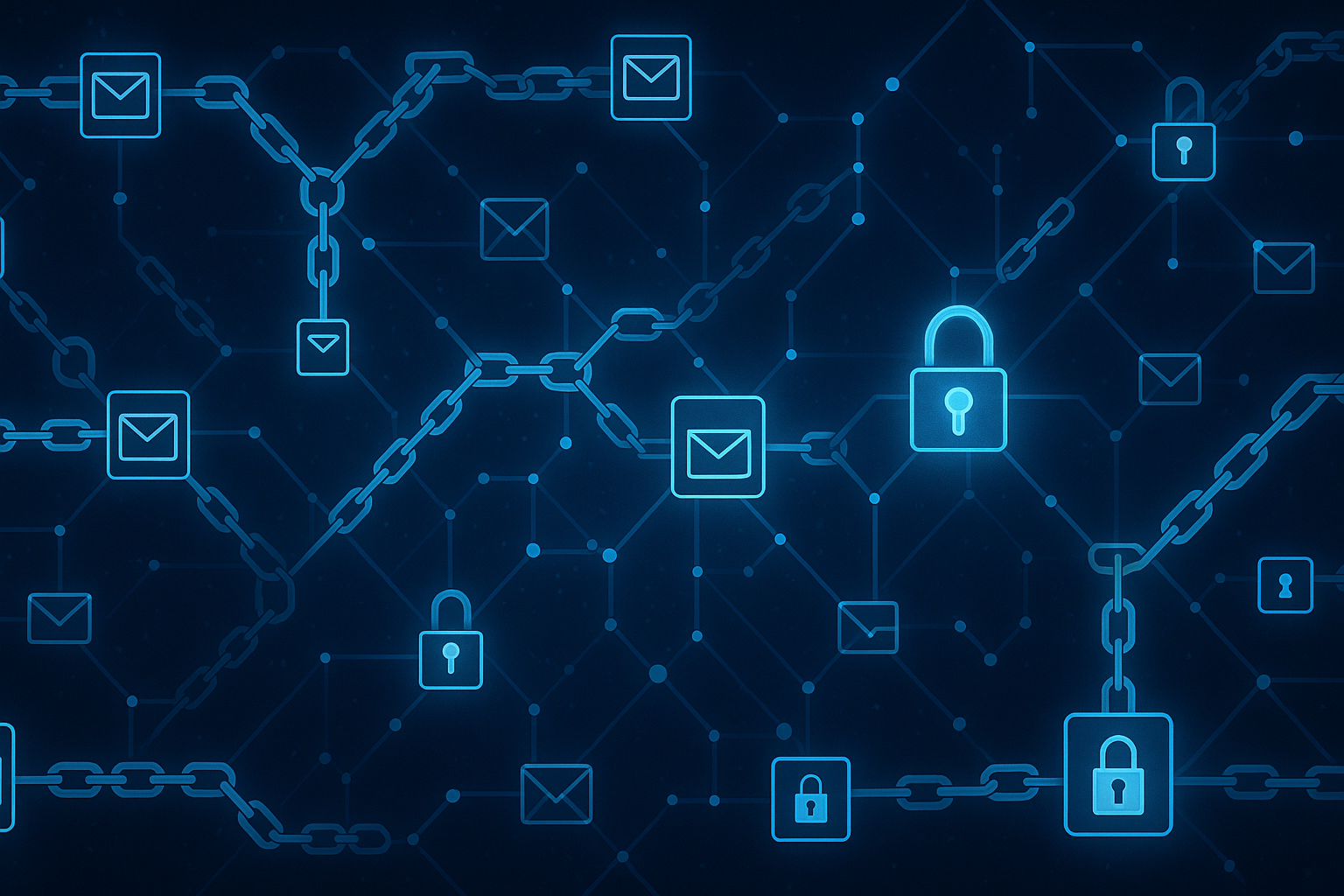
Leave a Reply